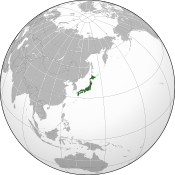Situation at damaged nuclear power plant remains 'very grave', says Japanese Prime Minister
Friday, March 25, 2011
| We are not in a position where we can be optimistic. | ||
—Naoto Kan, Prime Minister | ||
Two weeks after a disastrous earthquake and tsunami hit Japan, the situation at the severely damaged Fukushima I Nuclear Power Plant has been described by the Prime Minister as "very grave and serious". In a nationally televised report to the nation on Friday, Naoto Kan said the Japanese government was "not in a position where we can be optimistic."
Radiation is reported to still be leaking from the plant, in Fukushima prefecture. "The source of the radiation seems to be the reactor core," said Nuclear and Industrial Safety Agency official Hidehiko Nishiyama, adding that radiation was "more likely" coming from the core than from the reactor's spent fuel pool.
On Thursday three workers stepped into contaminated cooling water in the reactor's turbine room while trying to replace cables at reactor No. 3, Nishiyama said. The water seeped into the the boots of two of the workers, touching their skin and causing lesions; the third worker's clothing protected him from the water. The two workers with skin lesions were hospitalized for radiation exposure. The radiation level of the contaminated water measured 10,000 times the level of cooling water in an undamaged reactor.

(Image missing from Commons: image; log)
Work has been stopped on attempts to reattach a permanent power line to the cooling system in reactor No. 3, and the building has been evacuated. Nishiyama could give no predictions of when work would resume. The possibility that water is leaking from the core of reactor No. 3 increases the danger for workers who attempt to cool the crippled plant. The reactors must be cooled before more safety work can begin.
Japan had been using seawater for cooling since the disaster crippled the power plant's cooling systems, but U.S. officials were concerned that saltwater could harm the equipment, causing it to seize up and corrode, thereby worsening the situation.
Sources
- Peter Alford and Rick Wallace. "Radioactive water 'from core'" — The Australian, March 26, 2011
- "Japan's Prime Minister calling nuclear situation "very grave and serious"" — KTIV, March 25, 2011
- Julie Makinen. "Japan steps up nuclear plant precautions; Kan apologizes" — Los Angeles Times, March 25, 2011



